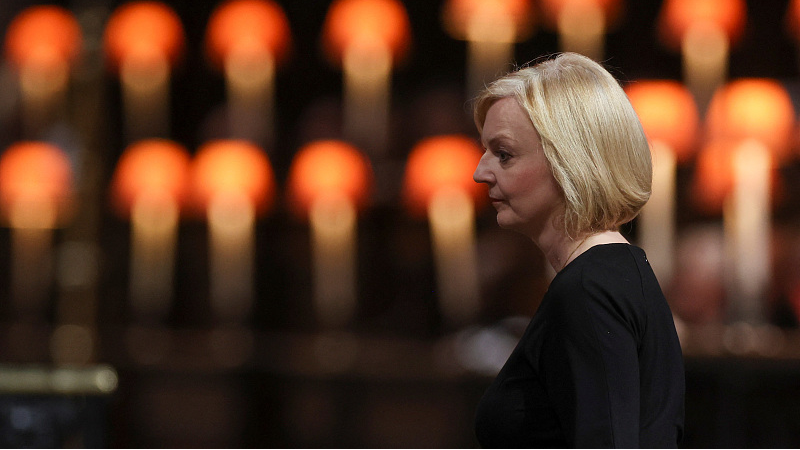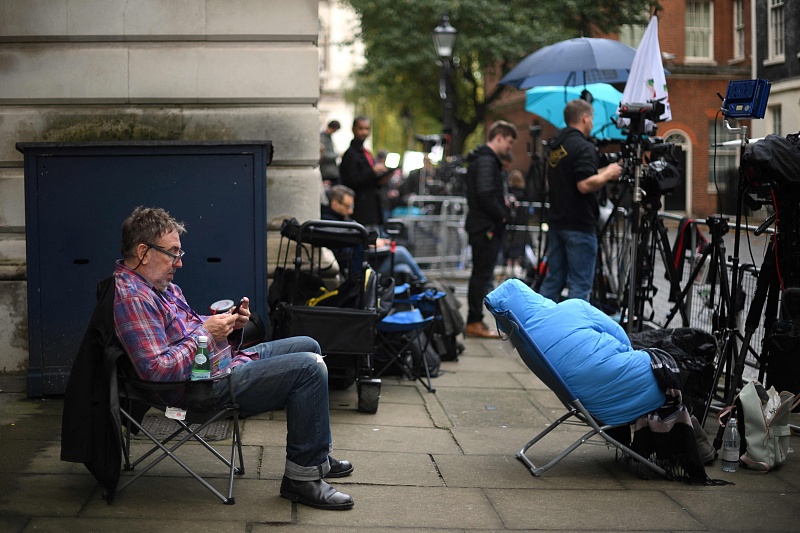
British Prime Minister Liz Truss attends a service of prayer and reflection, following the passing of Britain's Queen Elizabeth, at St Paul's Cathedral in London, England, September 9, 2022. /CFP
British Prime Minister Liz Truss attends a service of prayer and reflection, following the passing of Britain's Queen Elizabeth, at St Paul's Cathedral in London, England, September 9, 2022. /CFP
Editor's note: Thomas O. Falk is a London-based political analyst and commentator. He holds a Master of Arts in international relations from the University of Birmingham and specializes in U.S. affairs. The article reflects the author's opinions and not necessarily the views of CGTN.
Liz Truss' resigned after 45 days in office, and she will go down in history as Britain's shortest-serving Prime Minister. At the same time, there is a lesson to be learned from her departure: no more experiments.
Truss might have been the last person to realize that her tenure was about to end when she announced her resignation on October 20. At this point, the inevitability of her leaving had been the worst-kept secret in politics.
Over the summer, Truss had prevailed in the party's leadership contest, the search for former UK prime minister Boris Johnson's successor, and was supposed to lead the nation through one of the greatest crises of the post-war period. Throughout the entire 45 days, Britain finds its political landscape in shambles yet again.
Particularly shocking was the determination with which Truss dismantled her premiership, seemingly without any interest in the public's concerns, experts' opinions or the advice of party members.
Her vision to introduce and rely on Trickle Down Economics as espoused by UK former Prime Minister Margaret Thatcher and former U.S. President Ronald Reagan, i.e. the idea of lowering taxes for the wealthy to boost the economy, was simply rejected by the country and the financial markets.
It took a tumbling Pound and soaring interest rates for her to realize this. However, her fate became apparent when she finally sacked her Chancellor of the Exchequer and replaced him with Jeremy Hunt, who immediately shredded up everything Truss had planned.
The big question the country now asks is who will come after Truss, or rather, does anyone in the party exist who can provide much-needed political stability amid crises and with the power to implement a series of unpopular measures?
The Tories will decide on Truss's successor next week. Rishi Sunak, who narrowly lost the leadership contest to Truss a month ago, is currently the favorite. However, and this perhaps perfectly reflects the incredible political situation in Great Britain, Boris Johnson, according to reports, is also open to a return.
Why the Tories, post-Brexit, seemingly developed a taste for more extreme characters is anyone's guess. However, by now, it is evident that neither Johnson nor Truss, despite her loyal supporters and proclivity for dreaming big, and in Johnson's case, a unique talent to appeal to almost anyone, were able to produce any substance from these talents. In fact, one could argue that both left 10 Downing Street in a more desolate status quo than they first entered it.
However, the discussion about names is once again missing the mark. Far more important is the question of what kind of prime minister the country needs and what priorities he or she should establish.
Ironically, the Labour Party already realized that stability and seriousness in post-Brexit Britain are a must. After the party had become unelectable for many and suffered its biggest defeat since 1935 in 2019, under the then-leader of the Labour Party Jeremy Corbyn, its response was to make pragmatist Sir Keir Starmer its new leader. He might not sweep anyone away with his speeches, but he is a top-notch, no-nonsense politician who conveys stability and trust and is thus a stark contrast to both Johnson and Truss.

Journalists wait outside 10 Downing Street in central London, October 21, 2022. /CFP
Journalists wait outside 10 Downing Street in central London, October 21, 2022. /CFP
It is a blueprint the Tories ought to copy if they are genuine about getting the country out of its current perilous state. That leadership traits not only matter but make a real difference can be seen throughout the past 30 years of British politics.
Whether it was UK former Prime Minister John Major in the 1990s, Tony Blair from 1997, or David Cameron and, to some extent, successor Theresa May, all were considered rather mundane individuals, not flashy, but hard-working public servants, who, for the most part, were at the helm of stabilization and indeed economic success in Britain.
Such an individual is needed right now: a prime minister who takes care of the country's fundamental issues … excessive centralization, over-regulation, a frail economy, the dreadful costs of living, a high level of inequality, the overwhelmed healthcare system and the decrease in faith in its political institutions caused by these past years of turmoil.
All of these are issues that require stability, vision and determination. Or, perhaps, someone who seems mundane on the outside but knows how to deliver in office every single day, without distractions.
The price of the Johnson and Truss experience will be paid for by Britons, many of whom will end up worse off than before – all while the country will soon have had three prime ministers within two months.
These are extraordinary times in Great Britain. It is time for an ordinary politician, and no more experiments.
(If you want to contribute and have specific expertise, please contact us at opinions@cgtn.com. Follow @thouse_opinions on Twitter to discover the latest commentaries in the CGTN Opinion Section.)